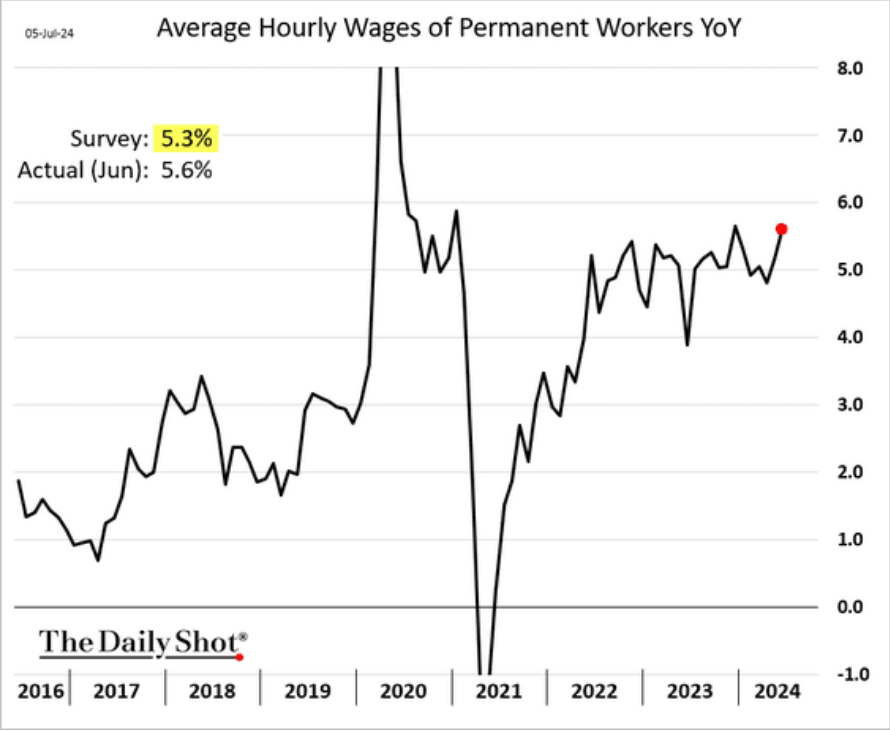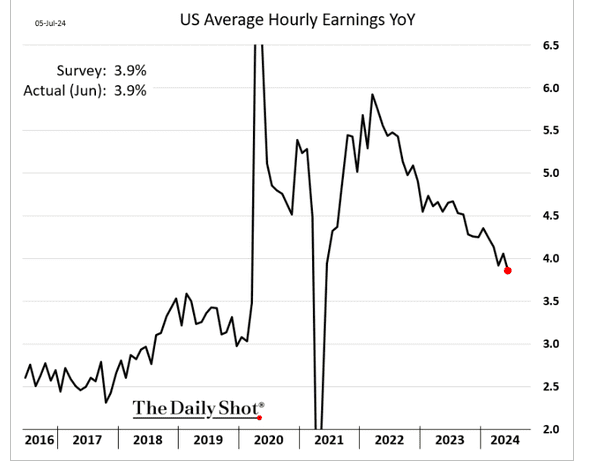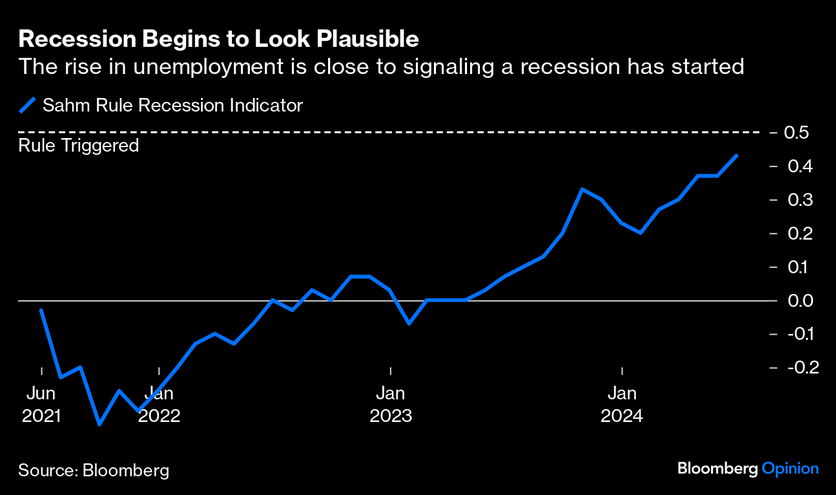July 8, 2024
France and finance
The French election has turned into a great example of how liberals like to fret about liberal democracy. It turns out, however, that Liberals do not actually believe in the "democracy" part of it, and are even only loosely tied to its "liberal" aspect.
Unlike in the UK where Labour won because everyone else lost, the left in France seems to have actually won.
The overwhelming majority of people in France are opposed to the centrist vision of Macron's party. When faced with the potential victory of the right-wing populist opposition, they turned out to back their historical political position on the left.
What is capital's response to this real democratic action by the people of France? Immediately to warn that implementing any left program, no matter how soft, would result in the destruction of the economy.
How democratic.
Bruno Le Maire warned of an ‘ideological fracture’ in France.
French economy minister Bruno Le Maire warned that the country could slip into a financial crisis if the high-spending, high-tax political programme embraced by the leftwing Nouveau Front Populaire alliance is put into action.
The real ideological fracture is the rejection of finance capital's poor excuse for an economy under Macron that has only worked for them.
Compare this with the support for Reeves' first statements to the media as Chancellor in the UK:
Rain Newton-Smith, chief executive of the CBI, said: “Firms will welcome the Chancellor wasting no time in committing to tackle the burdensome and time-consuming planning processes that are holding back critical investments.” (FT)
The push in France from the left-of-centre to the far right is to keep the popular Mélenchon from being Prime Minister. The reason is not what you would think. It is not because this will have any effect on implementing policy, as Mélenchon will hold sway over the LFI irrespective of his official position. The fear from the liberals and the fascists is that he will become ever more popular.
Just as Labour became more electable after ejecting Jeremy Corbyn, the Popular Front’s path to power might involve breaking with Melenchon to build a more centrist coalition — combining Macron’s group with the Greens and Socialists could get quite close to 289 seats. (BN)
The idea that a group that has just thrashed Macron is "unelectable" would be hilarious if it were not so pervasive in the press. The Greens and Socialists joined with the LFI because they are on the left, and they understand that the vote was against Macron's policies. To hitch their wagon to the political centre at this point would political self-immolation.
The Greens and Socialist Party leadership, however, have balked at the idea that the group on the left with the largest seat count (the LFI) would be the group to choose the PM. Such a position is hardly defensible.
Interestingly, before there was opposition to the idea, it was not really the LFI's intention that Mélenchon would be PM given that the Front already has a head of the legislative section.
The goal of directing negative attention to Mélenchon is that Macron wants to break up the left bloc and align with its right wing – the Socialist Party, the Greens and even perhaps the "more reasonable" Communists (according to the FT, Bloomberg and Reuters). The bankers in Macron's party would like to ignore the will of the vast majority of the people of France and continue to govern as if the vote did not matter.
Anyone but the larger left parties of the LFI, who did the organizing work to bring the various parties together to defeat the RN.
Again, how democratic.
Capital's cry is about the left's spending promises, but the real reason they are all upset is that the spending is balanced with tax increases. The LFI program would return France to a moderate social democracy and undo some of the most egregious pro-market reforms implemented by the centrists.
Now, none of this is particularly surprising. The political jostling is part of the game.
The issue is that the liberals have created this mess for themselves by asking the people what they feel. The gamble by the Macron centrist liberals was that, given the choice between him and the far right, the people would choose him. A classic liberal mistake is to announce that the left is dead and voting for them is a non-starter.
When the left joined together as only the French left can, the business class lost their mind. Putting aside their egos, their slightly different ideas of how fast the left program should be implemented, promoting some variations on the theme of working in the interests of different parts of the working class, and addressing the youth's discontent, the left offered a real alternative to a fascist protest vote, as well as to the policies of the extreme centre which the fascist vote was protesting.
This should be a lesson to the left. There is still mass appeal in a left-wing coalition. It must be centred on socialism, with the centre-left reduced to a minority tendency within that coalition.
But back to the liberals.
They are more concerned with the rise of the left than they are the rise of the right.
Tony Barber, long time liberal commentator, says in the FT that the RN has adopted a certain left-of-centre flavour and that they are not fascist at all. A reformed RN is simply a "replacement for the traditional centre-right".
This statement appears just above the announcement this morning that "Le Pen, Salvini to Join Orban’s New Far-Right EU Alliance". A centre-right, it would seem, of the fascist variety.
David Roche of Independent Strategy suggests that in terms of fiscal policy, the Popular Front might be even “more extreme than an RN government.” “Any relief at avoiding an RN outright victory will be short lived,” predicted Roche. He suggested it was still a good idea to short French OATS government bonds relative to German bunds.
Nico FitzRoy of Signum Global Advisors suggested that an attempt at a left-wing government led by a more moderate Socialist was the most likely outcome, as anything else would require members of the Popular Front, fresh from a victory, to accept the status of junior partners. “I don't think this government would last long,” FitzRoy added. “And, probably to the relief of markets, I don’t think it would be able enact much radical fiscal policy.”
The dream of the centrists is that they can manipulate the political system such that, no matter who wins, they will anoint themselves (and thus capital) as technocratic managers.
It is fantasy of course. Macron's policies, like those of the centre-right in the UK and liberals in other countries, result in the destruction of local economies, the dragging down of workers into destitution, and pushing them into the arms of the far right. The political game is to destroy any opposition from the left through baseless slander and fearmongering threats of economic destruction.
Only the left can defeat fascism. The real struggle is to sustain the broad left alliance while ejecting the few liberal entryists from the right currently occupying Socialist Party seats.
The main concern is that governing in such a situation is difficult. The left must hold fast while forcing the liberals to undo the unpopular policies. This was an election that rejected the centrist platform; not to follow through with the demands of the people would be to support a very unpopular version of liberal democracy.
Some graphs
Wage gains are being sustained in Canada

Not so much for the USA:

Which leads us to believe that a recession is about to fall upon the USA's working class.
